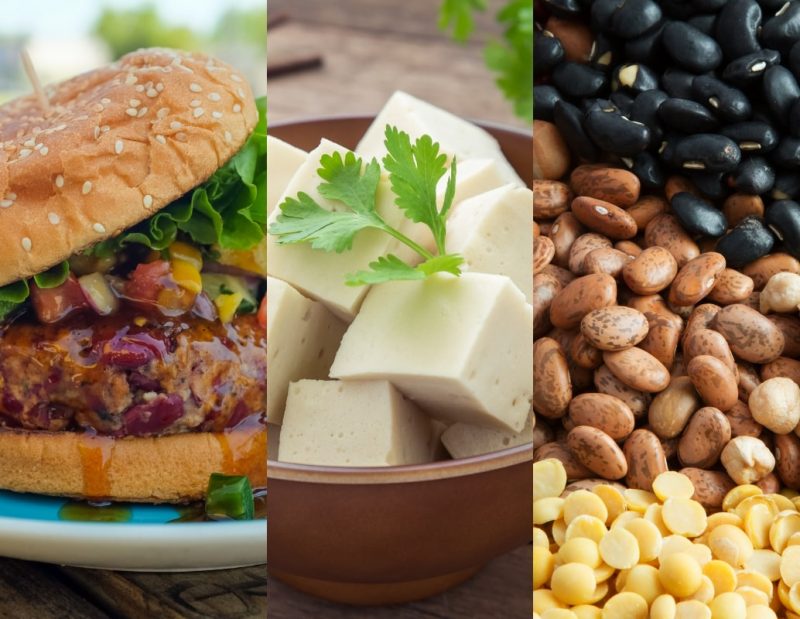Why you should eat less meat to improve your health (and how to do it)
Learn more about the many health benefits of reducing your meat consumption
Can you make a meal without meat? A lot of us have been brought up hearing that meat is essential to our diets and that it provides us with important nutrients like protein, vitamins, and minerals.
But what many of us don’t realize is that plant-based diets can also provide these same nutrients—as well as other powerful health benefits.
Why should you eat less meat?
A meat-based diet can actually pose certain risks to our health. By following a more plant-rich diet, you may be able to:
- Improve your overall heart health: People that eat less meat are generally at a lower risk of Type 2 diabetes and heart disease, whereas eating red meat is actually correlated to a higher risk.
- Reduce kidney toxins: Animal-sourced foods contain choline and carnitine, and these can get converted into TMAO, an atherosclerosis-inducing substance, meaning it hardens the arteries. TMAO accelerates the process of hardening the arteries—contributing to strokes, heart attacks, and kidney failure. [1]
- Reduce risk of cancer-causing viruses: Researchers from the National Cancer Institute purchased meat from three different supermarkets and found three different polyomaviruses in the meat. Polyomavirus is especially dangerous as it contains carcinogens and survives cooking temperatures. [2]
- Maintain a healthy weight: Meatless diets are associated with healthy weight management and maintenance. A healthy weight is connected to better cardiovascular health.
How can a plant-based diet help?
Plant-based diets focus on foods derived from plants. This type of diet can bring many health benefits, such as a lower risk of stroke, diabetes, and heart disease.
Plant-based diets—which either limit meat or eliminate it entirely—usually fit in these four main types:
- Flexitarian: Someone who eats eggs and dairy products, and occasionally meat, poultry, fish, and seafood
- Pescetarian: Someone who eats eggs, dairy products, fish and seafood, but no poultry or meat.
- Vegetarian: Someone who does not eat fish, seafood, meat, or poultry, but does eat eggs and dairy products.
- Vegan: Someone who does not eat any animal product, including fish, meat, seafood, poultry, eggs, and dairy products.

Which plant-based diet is right for me?
When you’ve been eating meat all your life, it might seem impossible to switch to a vegetarian or vegan diet.
The good news is that in 2019, the Mediterranean diet was named the best diet by the U.S. News and World Reports. [3] The Mediterranean diet is similar to a flexitarian diet as it is mainly based around plant-based foods along with poultry, fish, eggs, and dairy products, but limits meat. Nutrition research has looked at this diet through large population studies and clinical trials and has found to reduce the risk of heart disease, metabolic syndrome, diabetes, certain cancers, and depression. [4]
Whether you’re deciding to cut meat completely from your diet or simply aiming to eat less meat, all of these plant-based options provide a wide range of health benefits by limiting the amount of meat you eat.
Related:
5 simple healthy eating tips that are easy to follow

Some simple tips to help you eat less meat
Not ready to commit to a plant-based diet right now? Here are some simple (and effective) ways you can start reducing your meat consumption today.
- Make your favorite foods, but use substitutes: Most of your favorite foods likely have a plant-based alternative, and it’s easy to replicate these foods with all the meat substitutes on the market. Tofu is a popular soy-based meat substitute that’s easy to use and contains protein, fiber, and all nine essential amino acids. Beans and legumes are also a great substitute and provide fiber, protein, and many essential vitamins and minerals.
- Meatless Mondays: Meatless Monday is a movement that encourages people to not eat meat on Mondays – sign up on their website to get weekly tips and stories. By choosing one of more days a week where you don’t eat any meat. It is a great way to start adjusting your diet and habits.
- Get informed: There’s a plethora of information… if you want to deep dive into the reasons you should reduce or eliminate meat consumption from your diet, this is a great book: How Not to Die.
The decision to eat less meat may seem intimidating and maybe even impossible, but these simple tips will certainly make this change in your diet a lot easier and a lot healthier!
Need help achieving your health goals?
Our team at Natural Quanta is full of highly trained health professionals—including Dr. Afonso Salgado, a leading Physical Therapist and Nutritionist with a background in Naturopathy and Osteopathy. We use our trusted and science-based training and wellness programs to guide and educate our members on their health journey.
Your first visit includes a wellness assessment that shows where any areas of concern may be. Then, you and your health coach will work together to create a plan of action designed to help you see optimal results in a short period of time.
Get started today!
Sources:
3: U.S. News
